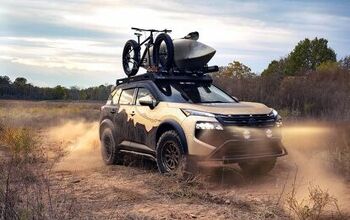The Cost of Going Further: Long-range Nissan Leaf Carries a Premium, Has Sights Set on GM

Nissan did Leaf fans a favor when it upped the model’s driving range to 151 miles for 2018, a healthy increase from the previous generation’s 107 miles. Still, 151 miles falls well short of the industry’s nice-sounding gold standard of 200 miles — the figure to beat (or at least reach) for most automakers. With range like the new Leaf’s, long-distance travel remains complicated, inconvenient, and perhaps even impossible.
It’s no secret that Nissan plans to offer an upgraded battery next year, but just how much extra cash you’ll need for that 60 kWh model remained a mystery. Until now.
According to order guides seen by CarsDirect, the extended-range 2019 Leaf, offered alongside the existing 40 kWh model, won’t start production until January. When the model eventually makes its way to dealers, expect a price premium in the neighborhood of $5,500.
That’s based on preliminary pricing. For the 2019 model year, a base, 40 kWh Leaf S retails for $30,885 after destination but before any state or federal incentives. The uplevel Leaf SL stickers for $37,095. Getting into a longer-legged version will probably cost you just over $36,000 for an S model, with the loaded SL retailing for about $42,500.
That puts the 60 kWh Leaf, which is said to offer 225 miles of range, in the same pricing territory as the 238-mile Chevrolet Bolt, though with a lower starting MSRP. However, the arrival of the new variant might bring reduced choice for buyers who aren’t as eager to avoid range anxiety. CarsDirect claims that once the long-range model hits the market, Nissan will likely scrap the 40 kWh SL model, which tops the base 60 kWh model in price. The lowly 40 kWh Leaf S would continue on as a top EV value choice.
While it doesn’t seem likely that many buyers will cross-shop the long-range Leaf and Tesla’s upcoming base Model 3 ($35,000) simply due to differences in brand appeal, the Nissan has one thing going for it the Tesla doesn’t: a full federal EV tax credit. Tesla’s full credit runs out at the end of the year, after which buyers will only see a $3,750 incentive for the first half of 2019. Nissan hasn’t yet sold 200,000 electric vehicles in the United States, so the full amount is waiting for anyone who wants it.
Over the first nine months of 2018, Leaf sales in the U.S. are basically flat on a year-to-date basis. It’s a slightly misleading statistic, as the changeover period for the new model basically erased January’s tally, with February’s coming in at half of average. Since then, the Leaf has posted monthly year-over-year increases more often than not. Last month’s Leaf volume showed a 48.2 percent increase over the previous September.
[Images: © 2017 Matthew Guy/TTAC, Nissan]

More by Steph Willems
Latest Car Reviews
Read moreLatest Product Reviews
Read moreRecent Comments
- Amy I owned this exact car from 16 until 19 (1990 to 1993) I miss this car immensely and am on the search to own it again, although it looks like my search may be in vane. It was affectionatly dubbed, " The Dragon Wagon," and hauled many a teenager around the city of Charlotte, NC. For me, it was dependable and trustworthy. I was able to do much of the maintenance myself until I was struck by lightning and a month later the battery exploded. My parents did have the entire electrical system redone and he was back to new. I hope to find one in the near future and make it my every day driver. I'm a dreamer.
- Jeff Overall I prefer the 59 GM cars to the 58s because of less chrome but I have a new appreciation of the 58 Cadillac Eldorados after reading this series. I use to not like the 58 Eldorados but I now don't mind them. Overall I prefer the 55-57s GMs over most of the 58-60s GMs. For the most part I like the 61 GMs. Chryslers I like the 57 and 58s. Fords I liked the 55 thru 57s but the 58s and 59s not as much with the exception of Mercury which I for the most part like all those. As the 60s progressed the tail fins started to go away and the amount of chrome was reduced. More understated.
- Theflyersfan Nissan could have the best auto lineup of any carmaker (they don't), but until they improve one major issue, the best cars out there won't matter. That is the dealership experience. Year after year in multiple customer service surveys from groups like JD Power and CR, Nissan frequency scrapes the bottom. Personally, I really like the never seen new Z, but after having several truly awful Nissan dealer experiences, my shadow will never darken a Nissan showroom. I'm painting with broad strokes here, but maybe it is so ingrained in their culture to try to take advantage of people who might not be savvy enough in the buying experience that they by default treat everyone like idiots and saps. All of this has to be frustrating to Nissan HQ as they are improving their lineup but their dealers drag them down.
- SPPPP I am actually a pretty big Alfa fan ... and that is why I hate this car.
- SCE to AUX They're spending billions on this venture, so I hope so.Investing during a lull in the EV market seems like a smart move - "buy low, sell high" and all that.Key for Honda will be achieving high efficiency in its EVs, something not everybody can do.



































Comments
Join the conversation
225 miles is not "long-range", in fact it's well below average if compared with ICE-powered cars. There's no reasons to hold EVs to a different, lower standard than ICE-powered cars, and so calling this version of Leaf "long-range" is a lie. As if that wasn't bad enough, the Leaf's below-average range is compounded by a well-below-average charging time, which significantly exceeds industry standards of 5 minutes or less for filling a fuel tank.
$5 grand for the equivalent of a 3 gallon larger gas tank - sounds like the deal of the century.